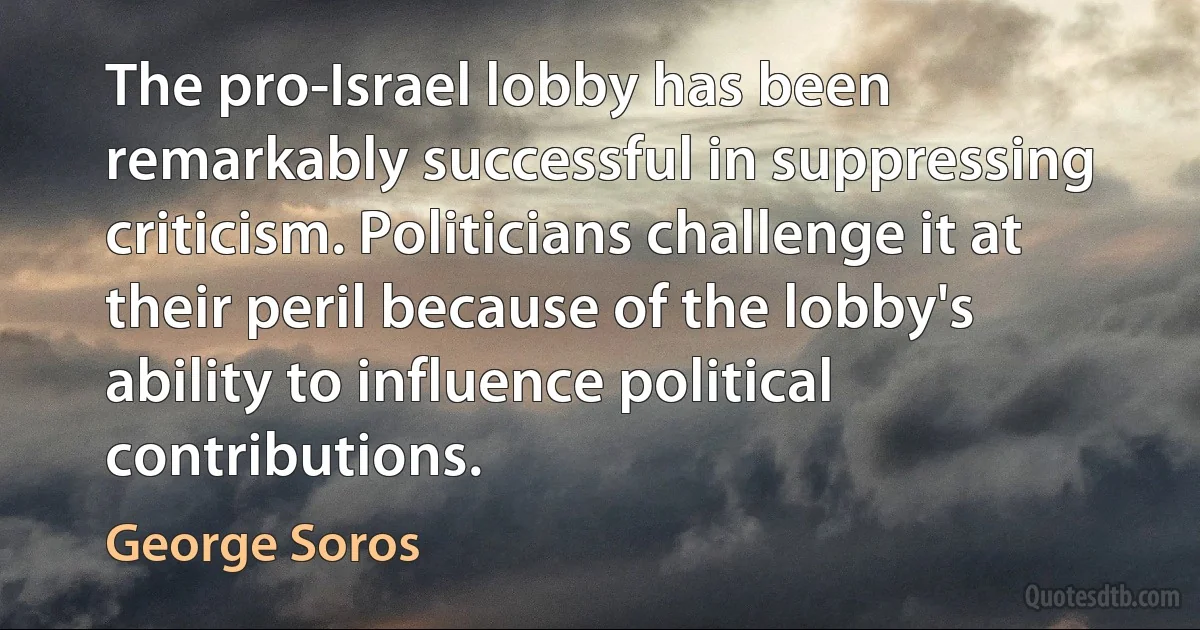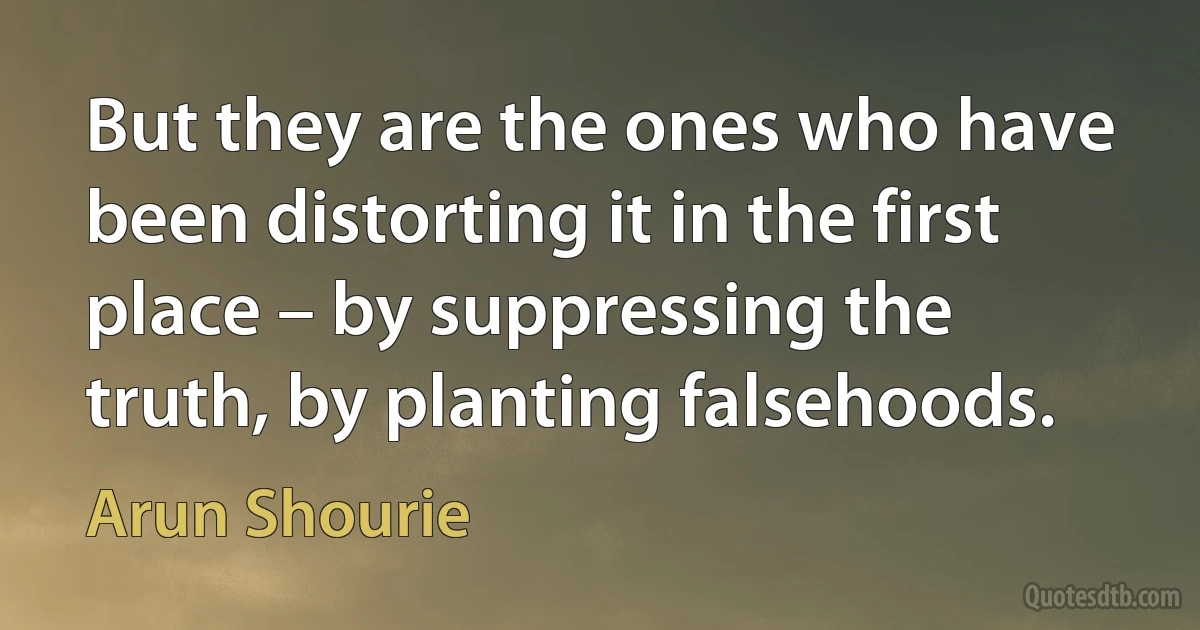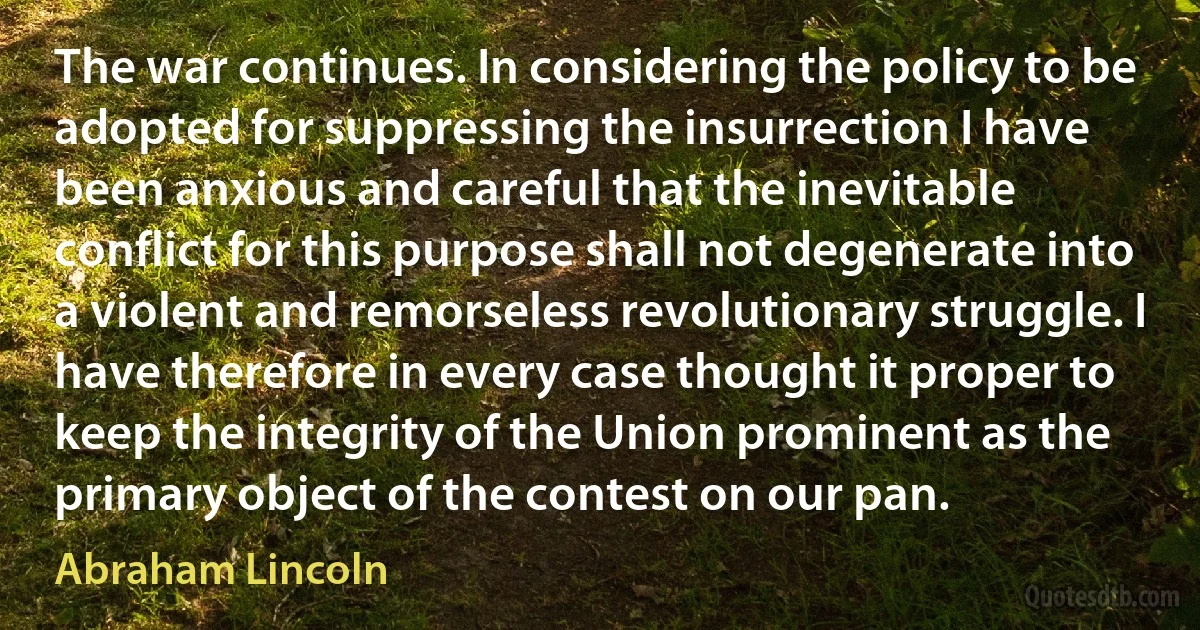Suppressing Quotes - page 3
The pro-Israel lobby has been remarkably successful in suppressing criticism. Politicians challenge it at their peril because of the lobby's ability to influence political contributions. ... Following his criticism of repressive Israeli policy on the West Bank, former president Jimmy Carter has suffered the loss of some of the financial backers of his center.

George Soros
You made the born noble yours, welcoming him as what he was, the Sent of Heaven: you did not force him either to die or become your enemy; idly neglecting or suppressing him as what he was not, a thing of no worth. You accepted the blessed light; and in the shape of infernal lightning it needed not to visit you. How, like an immense mine-shaft through the dim oppressed strata of society, this Institution of the Priesthood ran; opening, from the lowest depths towards all heights and towards Heaven itself, a free road of egress and emergence towards virtuous nobleness, heroism and well-doing, for every born man.

Thomas Carlyle
The only way which this ruling sees out of what it calls "the communal strife” is that Hindu history should be substantially diluted and tailored to the needs of Islamic imperialism, and that Muslim history should be given a liberal coat of whitewash or even made to pass muster as national history. This has been the main plank in the platform for "national integration”. Hitherto this Experiment with Untruth was confined mainly to Muslim and Communist "historians” who have come to control the Indian History Congress, the Indian Council of Historical Research, and even the University Grants Commission. Now it has been taken up by the National Integration Council. The Ministry of Education of the Government of India has directed the education departments in the States to extend this experiment to school-level text-books of history. And this perverse programme of suppressing truth and spreading falsehood is being sponsored by a state which inscribes Satyameva Jayate on its emblem.

Sita Ram Goel
While in totalitarian regimes, government controls the media and criminalizes journalists, bloggers and human rights defenders who do not echo the State's propaganda, in numerous democratic countries, the media are largely in private hands - too few hands. Often media are controlled by conglomerates responsive to corporations and advertisers who determine the content of news and other programmes, frequently disseminating disinformation or suppressing crucial information necessary for democratic discourse. Indeed, the media blackout on important issues constitutes a grave obstacle to democracy, since absent sufficient information and without free and pluralistic media, democracy is dysfunctional and the political process, including elections, becomes a mere formality - not an expression of the will of the people.

Alfred de Zayas
The meaning of the First Amendment has been, and will be, shaped by each American generation: by judges, political leaders, citizens. There will always be authorities who try to make their own lives more comfortable by suppressing critical comment.... But I am convinced that the fundamental American commitment to free speech, disturbing speech, is no longer in doubt.

Anthony Lewis
The most terrible thing about materialism, even more terrible than its proneness to violence, is its boredom, from which sex, alcohol, drugs, all devices for putting out the accusing light of reason and suppressing the unrealizable aspirations of love, offer a prospect of deliverance.

Malcolm Muggeridge
Let us never imagine that faith can ever be furthered by suppressing doubt, let alone by suppressing evidence. All truth is one, and religion must be as eager as science to know the truth as far as man can perceive it. If something we have treasured as truth is really contradicted by unanswerable evidence, then in the name of the God of truth we must part with it however venerable it may be. Let us never suppose that we can take over faith from our parents without examination, or believe anything merely because another says it is true. But let us not be content with a static agnosticism which never rouses itself to make inquiry. Let us examine the evidence and then in complete loyalty to its trend make a leap both of intellect and will, and, committing ourselves, acting as if all were established, try out in life the faith that carries us on wings after the hard road of fact and reason stops.

Leslie Weatherhead
Being a lover of freedom, when the revolution came in Germany, I looked to the universities to defend it, knowing that they had always boasted of their devotion to the cause of truth; but, no, the universities immediately were silenced. Then I looked to the great editors of the newspapers whose flaming editorials in days gone by had proclaimed their love of freedom; but they, like the universities, were silenced in a few short weeks. Then I looked to individual writers who, as literary guides of Germany, had written much and often concerning the place of freedom in modern life; but they, too, were mute.Only the church stood squarely across the path of Hitler's campaign for suppressing truth. I never had any special interest in the church before, but now I feel a great affection and admiration because the church alone has had the courage and persistence to stand for intellectual truth and moral freedom. I am forced thus to confess that what I once despised I now praise unreservedly.

Albert Einstein
I hate the press; I hate you especially. But the fact is we need you. We need a free press. We must have it. It's vital. If you want to preserve - I'm very serious now - if you want to preserve democracy as we know it, you have to have a free and many times adversarial press. And without it, I am afraid that we would lose so much of our individual liberties over time. That's how dictators get started. They get started by suppressing free press. In other words, a consolidation of power. When you look at history, the first thing that dictators do is shut down the press... [W]e need to learn the lessons of history.

John McCain
Agreeably to the request of the House of Representatives, communicated in their resolution of the 16th instant, I proceed to state under the reserve therein expressed, information received touching an illegal combination of private individuals against the peace and safety of the Union, and a military expedition planned by them against the territories of a power in amity with the United States, with the measures I have pursued for suppressing the same....

Thomas Jefferson
Men who are never flagrantly dishonest are at times unveracious in small matters, colouring or suppressing facts with a conscious purpose; and writers who never stole an idea nor pretended to honours for which they had not striven, may be found lapsing into small insincerities, speaking a language which is not theirs, uttering opinions which they expect to gain applause rather than the opinions really believed by them. But if few men are perfectly and persistently sincere, Sincerity is nevertheless the only enduring strength.
The principle is universal, stretching from the highest purposes of Literature down to its smallest details. It underlies the labour of the philosopher, the investigator, the moralist, the poet, the novelist, the critic, the historian, and the compiler. It is visible in the publication of opinions, in the structure of sentences, and in the fidelity of citations.

George Henry Lewes



